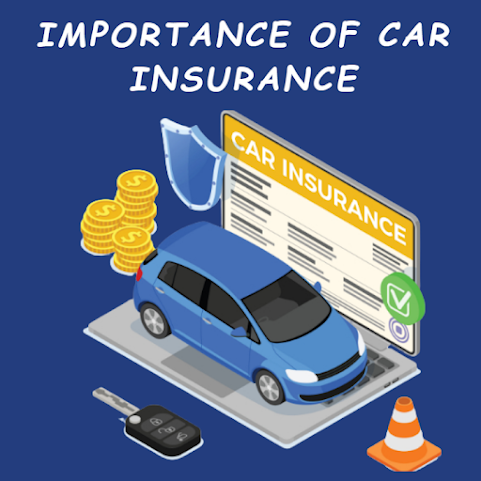Importance of car insurance in life: Protecting Your Vehicle and Yourself
Introduction to Car Insurance:
Car insurance plays a critical role in protecting your vehicle and finances in the event of an accident, theft, or damage. Understanding the ins and outs of car insurance is crucial for every vehicle owner. In this comprehensive article, we will explore the various aspects of car insurance, including its importance, types of coverage, factors affecting premiums, and tips for finding the best car insurance policy. Whether you're a new driver or an experienced one, this guide will provide you with valuable insights to make informed decisions about your car insurance needs.
The Importance of Car Insurance
Car insurance serves as a safeguard against unexpected events and financial liabilities associated with owning and operating a vehicle. Accidents can happen anytime, and the costs involved in repairing or replacing a car, as well as potential medical expenses, can be overwhelming. Car insurance offers peace of mind by providing financial protection against such situations. Additionally, in many countries, having at least a minimum level of car insurance coverage is a legal requirement to ensure road safety and protect all parties involved in an accident.
Types of Car Insurance Coverage
Liability Coverage:
Liability coverage is the most basic form of car insurance and covers damages caused to other people and their property in an accident where you are at fault. It includes bodily injury liability (covering medical expenses and legal fees) and property damage liability (covering repair or replacement costs).
Collision Coverage:
Collision coverage protects against damages to your own vehicle resulting from a collision with another car or object, regardless of fault. It helps cover repair or replacement costs and is especially valuable for newer or more expensive vehicles.
Comprehensive Coverage:
Comprehensive coverage provides protection against non-collision-related damages, such as theft, vandalism, fire, natural disasters, or hitting an animal. It offers peace of mind by covering repair or replacement costs for your vehicle.
Uninsured/Underinsured Motorist Coverage:
Uninsured/underinsured motorist coverage protects you if you're involved in an accident with a driver who either doesn't have insurance or lacks sufficient coverage to pay for damages. It ensures that you receive the necessary compensation, even if the other party is unable to provide it.
Medical Payments Coverage:
Medical payments coverage, also known as personal injury protection (PIP), covers medical expenses for you and your passengers in the event of an accident. It may include hospital bills, rehabilitation costs, and even lost wages due to injuries.
Factors Affecting Car Insurance Premiums:
Several factors influence the cost of your car insurance premiums. Understanding these factors can help you find ways to lower your insurance costs. Here are the key elements that insurers consider when calculating your premiums:
Driving Record:
Your driving record plays a pivotal role in determining your car insurance rates and coverage options. It serves as a reflection of your driving history and habits, providing insurers with valuable insights into your level of risk as a policyholder. A clean driving record with no accidents, traffic violations, or claims demonstrates responsible and safe driving behavior, which can result in lower insurance premiums.
Age and Experience:
Young and inexperienced drivers typically pay higher insurance premiums due to the increased likelihood of accidents. As you gain more driving experience and demonstrate responsible behavior, your premiums may decrease.
Vehicle Type and Usage:
The type of vehicle you drive and how you use it can affect your insurance premiums. Factors such as the make, model, age, safety features, and usage (personal or commercial) all contribute to the overall risk assessment by insurers.
Location:
Where you live can impact your insurance rates. Insurers consider the area's crime rate, population density, and frequency of accidents to determine the likelihood of filing a claim. Urban areas with higher traffic tend to have higher premiums compared to rural areas.
Coverage and Deductibles
When it comes to car insurance, understanding coverage and deductibles is essential for making informed decisions about your policy. Coverage refers to the types of protection your insurance policy provides. It typically includes liability coverage, which pays for damages or injuries you cause to others in an accident, and may also encompass collision and comprehensive coverage, which protect your own vehicle from damage or loss.
Credit History :
In some regions, insurers may consider your credit history when determining premiums. Studies suggest that individuals with good credit tend to have fewer insurance claims, resulting in lower rates.
Best Tips for Finding the Best Car Insurance Policy:
Finding the right car insurance policy can be a daunting task with numerous options available in the market. Here are some valuable tips to help you navigate through the process and secure the best coverage:
Shop Around and Compare Quotes:
When it comes to car insurance, one of the most effective strategies to secure the best coverage at competitive rates is to shop around and compare quotes. Insurance premiums can vary significantly from one provider to another, so it's essential to explore multiple options. Take the time to research different insurance companies, their reputations, and the specific coverage they offer. Requesting quotes from various insurers allows you to compare the costs and coverage terms side by side. Remember to provide accurate and consistent information when requesting quotes to ensure you receive accurate estimates.
Evaluate Coverage Needs:
Assess your specific coverage requirements based on your vehicle, driving habits, and personal circumstances. Ensure that the policy you choose adequately protects you and aligns with your budget.
Consider Deductibles:
Determine the deductibles you can comfortably afford in the event of a claim. Opting for a higher deductible can lower your premiums, but make sure it's an amount you can pay out of pocket if needed.
Check for Discounts:
Inquire about available discounts. Insurance companies often offer discounts for various factors, such as safe driving records, multiple policies, anti-theft devices, or completing defensive driving courses.
Read and Understand the Policy:
Pay attention to coverage limits, exclusions, claim procedures, and cancellation policies. Seek clarification from the insurer if you have any doubts or concerns.
Customer Service and Claim Process
Research the insurer's reputation for customer service and their claim settlement process. Prompt and hassle-free claims handling is crucial when you need assistance during challenging times.
Conclusion:
Ensuring Responsible Vehicle Ownership: The Vital Significance of Car Insurance. It provides financial protection and ensures peace of mind in the face of unforeseen circumstances. By understanding the types of coverage available, the factors influencing premiums, and following the tips for finding the best policy, you can make informed decisions and secure the right car insurance coverage for your needs. Remember, protecting yourself, your vehicle, and others on the road is not only a legal requirement in many places but also a responsible choice that safeguards your financial well-being.






0 Comments